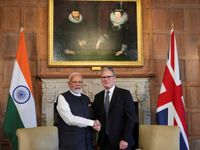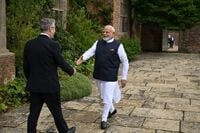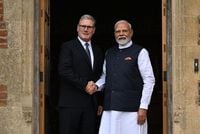On July 24, 2025, British Prime Minister Keir Starmer and Indian Prime Minister Narendra Modi gathered at Chequers, the British leader’s country residence near London, to sign a landmark free trade agreement that promises to reshape economic ties between the United Kingdom and India. After more than three years of stop-start negotiations, this historic deal was formally sealed by the UK and Indian trade ministers, Jonathan Reynolds and Piyush Goyal, marking the biggest and most economically significant trade agreement Britain has made since leaving the European Union in 2020.
Starmer hailed the agreement as a "landmark moment" and emphasized its potential to boost the British economy by £4.8 billion annually, while Modi described it as "a historic day in our bilateral relations" and a "blueprint for our shared prosperity." The trade deal is projected to increase bilateral trade by £25.5 billion ($34 billion) annually by 2040 and attract nearly £6 billion ($8 billion) in investments from companies on both sides. The pact also includes ambitious plans for cooperation beyond trade, encompassing defense, migration, climate, health, education, technology, and innovation.
The agreement dramatically cuts tariffs on a wide range of goods. For British exporters, average tariffs on goods shipped to India will fall from 15% to just 3%. Specific sectors will see even steeper reductions: import taxes on Scotch whisky and gin will be halved from 150% to 75% immediately, then lowered further to 40% within a decade. Automotive tariffs will plummet from over 100% to 10% under a quota system, opening new avenues for British carmakers such as BMW, Nissan, Aston Martin, and Tata-owned Jaguar Land Rover.
From India’s perspective, the deal is equally transformative. Ninety-nine percent of Indian exports to the UK—including textiles, shoes, food products, jewelry, and gems—will face zero import duties, making Indian goods more competitive in the British market. The Indian government highlighted that this agreement will "add momentum to the 'Make in India' led growth and export promotion," with industries like leather projected to increase their UK market share by 5% within two years.
The deal also includes provisions to ease temporary business visits and social security contributions. Indian workers temporarily seconded to the UK and vice versa will only pay social security taxes in their home countries, rather than both, a move welcomed by the Indian government as "an unprecedented achievement." UK Business Secretary Jonathan Reynolds dismissed concerns that the agreement might undercut British workers, assuring that "there is no tax advantage for hiring an Indian worker over a British worker."
While the agreement represents a significant breakthrough, critics have voiced concerns about its limitations. The UK’s financial and legal services sectors did not secure as much access to India’s markets as hoped, and negotiations continue over a bilateral investment treaty to protect investments on both sides. Environmental and human rights advocates have also criticized the deal for lacking binding protections. Tom Wills, director of the Trade Justice Movement, noted that the agreement "fails to include binding protections for labour rights, environmental standards or public health." The London Mining Network echoed these concerns, highlighting the absence of robust climate safeguards, particularly regarding coal extraction in India.
Further discussions are ongoing about the UK’s planned carbon border adjustment mechanism, a tax on high-carbon industries which India argues could unfairly affect its exports. Despite these challenges, Indian Commerce Minister Piyush Goyal expressed optimism, stating that the deal "demonstrates how serious India is about engaging with the developed world." He praised the mutual respect shown during negotiations, saying, "We were able to recognize and respect each other's sensitivities, so that contentious issues were not allowed to break the success of the negotiations."
The signing ceremony was attended by senior officials, including UK Chancellor of the Exchequer Rachel Reeves and Indian Minister of External Affairs Subrahmanyam Jaishankar. Modi’s visit to the UK also included a meeting with King Charles III at his Sandringham estate, where the Indian Prime Minister presented the monarch with a tree to be planted in autumn 2025 as part of an environmental initiative honoring mothers.
Beyond the economic sphere, Modi and Starmer discussed other pressing issues during their meetings, including the tragic Air India crash in June 2025, which claimed 241 lives, including 52 British nationals. The two leaders also addressed human rights concerns, with Starmer raising the case of Jagtar Singh Johal, a Sikh activist from Dumbarton detained in India since 2017. Scotland Secretary Ian Murray described the case as "right at the top of the agenda," and the UK government is actively seeking resolution.
The trade deal is expected to create more than 2,200 British jobs as Indian firms expand their UK operations and British companies secure fresh opportunities in India. Sectors such as technology, aerospace, manufacturing, and dairy products are poised for growth, with the agreement facilitating increased collaboration and investment.
Despite the deal's significance, it still requires ratification by both the UK and Indian parliaments, a process anticipated to take several months before the agreement comes fully into effect. Nevertheless, the signing sends a powerful signal amid a global climate of rising protectionism, underscoring the commitment of both nations to deepen economic ties and cooperation.
As Modi put it during the signing, the UK and India are "natural partners," united not only by history and culture but also by a shared vision for a prosperous and collaborative future. Starmer echoed this sentiment, emphasizing the "unique bonds of history, of family and of culture," and expressing a desire to build an "even more ambitious, modern and focused" relationship that extends well beyond trade.
With this deal, the UK and India have opened a new chapter in their economic partnership, one that promises to benefit workers, businesses, and consumers on both sides while setting a foundation for closer ties across a spectrum of global challenges.



